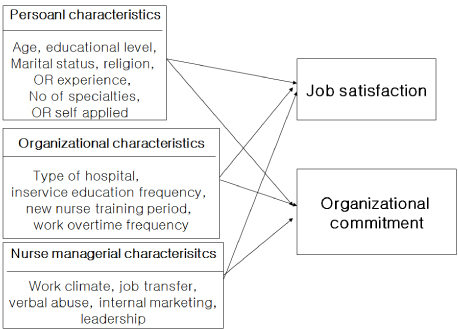J Korean Acad Nurs Adm.
2010 Mar;16(1):86-100.
A Study on the Job Satisfaction and Organizational Commitment among Perioperative Nurses
- Affiliations
-
- 1Day Surgery Center, Samsung Medical Center, Korea. ks11.yoon@samsung.com
Abstract
- PURPOSE
This study was done to examine the relationship of job satisfaction and organizational commitment of perioperative nurses. METHOD: The subjects of this study were 500 perioperative nurses from 11 hospitals. The data were collected by self-reporting questionnaires from Sep. 19 to Sep. 27, 2009.
RESULTS
There was statistically significant relationship among the five variables. The analyses of covariance of these five variables revealed overall significant (p<.05). Stepwise linear multiple regression analyses were used to examine the influence of these five variables. Results indicated that the variables for verbal abuse (p<.01), workplace climate (p<.01), internal marketing (p<.001), and job transfer (p<.001) contributed significantly to the job satisfaction (adjusted R square=.426), while the verbal abuse (p<.01), internal marketing (p<.01), leadership style (p<.001) and workplace climate (p<.001) did to the organizational commitment (adjusted R square=.351). Canonical correlation analyses revealed that internal marketing and workplace climate contributed most significantly both to job satisfaction and organizational commitment.
CONCLUSION
This study found that all these five nursing managerial factors were important influential on both job satisfaction and organizational commitment of perioperative nurses. Addressing these factors with further research will surely improve the commitment of these nurses and ultimately lead to better perioperative nursing care.
Keyword
MeSH Terms
Figure
Reference
-
1. Bass BM. Leadership & performance beyond expectoration. 1985. New York: Free Press.2. Buback D. Assertive training to prevent verbal abuse in the OR. AORN J. 2004. 79(1):148–164.3. Cameron KS, Whetten DA. Organizational effectiveness: A comparison of multiple models. 1983. NY: Acad Press Inc.4. Chang CS, Chang HC. Perceptions on internal marketing and organizational commitment by nurses. J Adv Nurs. 2008. 65(1):92–100.
Article5. Cook JK, Green M, Topp RV. Exploring the impact of physician verbal abuse on perioperative nurses. AORN J. 2001. 74(3):317–331.
Article6. Cha SK. A study on the influence of internal marketing factors for the nurses' organizational commitment. 2000. Seoul: Korea University;Unpublished doctoral dissertation.7. Choi JY. Relationship between nursing organizational climate and job satisfaction of nurses in general hospitals. J Korean Acad Nurs Adm. 2000. 6(2):227–243.8. Doo EY, Lim JY, Seomun GA, Kim IA. An analysis of nurse's perception of internal marketing activities affecting an nurse's turnover intention, nursing task performance and nursing productivity. J Korean Acad Nurs Adm. 2005. 11(1):1–12.9. George WR. Internal marketing and organizational behavior a partnership in developing customer-conscious employees at every level. J Bus Res. 1990. 20.
Article10. Hwang BL. A study on nurses' attitude of job satisfaction in operating rooms. 2008. Seoul: Graduate School of Hanyang University;Unpublished master's thesis.11. Jones AP, James LR. Psychological climate dimension and relationships of individual and aggregated work environment perceptions. Organ Behav Hum Perform. 1979. 23:201–250.
Article12. Kim JK. Determinants of organizational effectiveness on hospital nursing. 2005. Seoul: Seoul National University;Unpublished doctoral dissertation.13. Locke EA. The nature and causes of job satisfaction: handbook of industrial and organizational psychology. 1976. Chicago: Rand McNally.14. Lee KS. A study on the characteristic traits and stress factor of operating room nurses. 1991. Seoul: Graduate School of Public Administration, Kyung Hee University;Unpublished master's thesis.15. Lee TK. The effects of organizational climates on the organizational commitment. 2008. Seongnam: Kyungwon university;Unpublished doctoral dissertation.16. McNeese-Smith D. Job satisfaction, productivity, and organizational commitment: The result of leadership. J Nurs Adm. 1995. 25(9):17–26.17. Mowday RT, Steers RM, Porter LW. The measurement of organizational commitment. J Vocat Behav. 1979. 14:224–247.
Article18. Mowday RT, Porter LW, Steers RM. Employee-organization linkages: The psychology of commitment, Absenteeism and Turnover. 1982. New York: Acdem Press.19. Mowday RT, Porter LW, Steers RM. Employee-organization linkage: The psychology of commitment, absenteeism, and turnover. 1982. New York: Academ Press.20. Nam KD, Yoon KS, Park SA, Jang BY, Sung YH. Verbal Abuse of Operating Room Nurses by Physicians and Other Nurses. J Korean Acad Nurs Adm. 2006. 12(3):343–353.21. Oh SH. A correlational study between internal marketing factor and job satisfaction, organizational commitment among hospital nurses. 2004. Kwangju: Chosun University;Unpublished master's thesis.22. Park SA, Yun SN. A study for development of a tool measuring organizational characteristics in nursing. J Nurs Acad Soc. 1986. 16(3):31–37.
Article23. Park SA, Yun SN. A study on organizational characteristics in hospital nursing. Seoul J Nurs. 1987. 2(1):61–69.24. Park HT. Transformational and transactional leadership styles of the nurse administrators and job satisfaction, organizational commitment in nursing service. 1997. Seoul: Ewha Womans University;Unpublished master's thesis.25. Thompson JA. Why work in perioperative nursing? Baby Boomers and Generation Xers Tell All. AORN J. 2007. 86(4):564–587.
Article26. Yom YH. The workplace empowerment on staff nurses' organizational commitment and intent to stay. J Korean Acad Nurs Adm. 2006. 12(1):23–31.27. Yoon KS, Park SA. Development and validation of an instrument to measure the job satisfaction of perioperative nurses. J Korean Clin Nurs Res. 2009. 15(1):93–106.28. Yoon SH. A model for organizational effectiveness. J Korean Acad Nurs Adm. 2000. 8(3):457–474.
- Full Text Links
- Actions
-
Cited
- CITED
-
- Close
- Share
- Similar articles
-
- Effect of Nursing Wok Environment, Job Crafting and Organizational Commitment on Nurses’ Job Satisfaction
- Effect of Self-leadership Recognized by Newly-employed Nurses on Job Satisfaction: Mediating Effect of Organizational Commitment
- Mediation Effect of Job Satisfaction between Internal Marketing and Organizational Commitment of Nurses in Small and Medium-sized Hospitals
- The Relationship of Negative Emotion, Emotion Suppression, and Job Satisfaction to Organizational Commitment in Hospital Nurses
- A Study on the Influence of Job Characteristics Perceived by Nurses on Their Job Satisfaction and Organizational Commitment: Focusing on Moderating Effect of Individual Personality Characteristics


